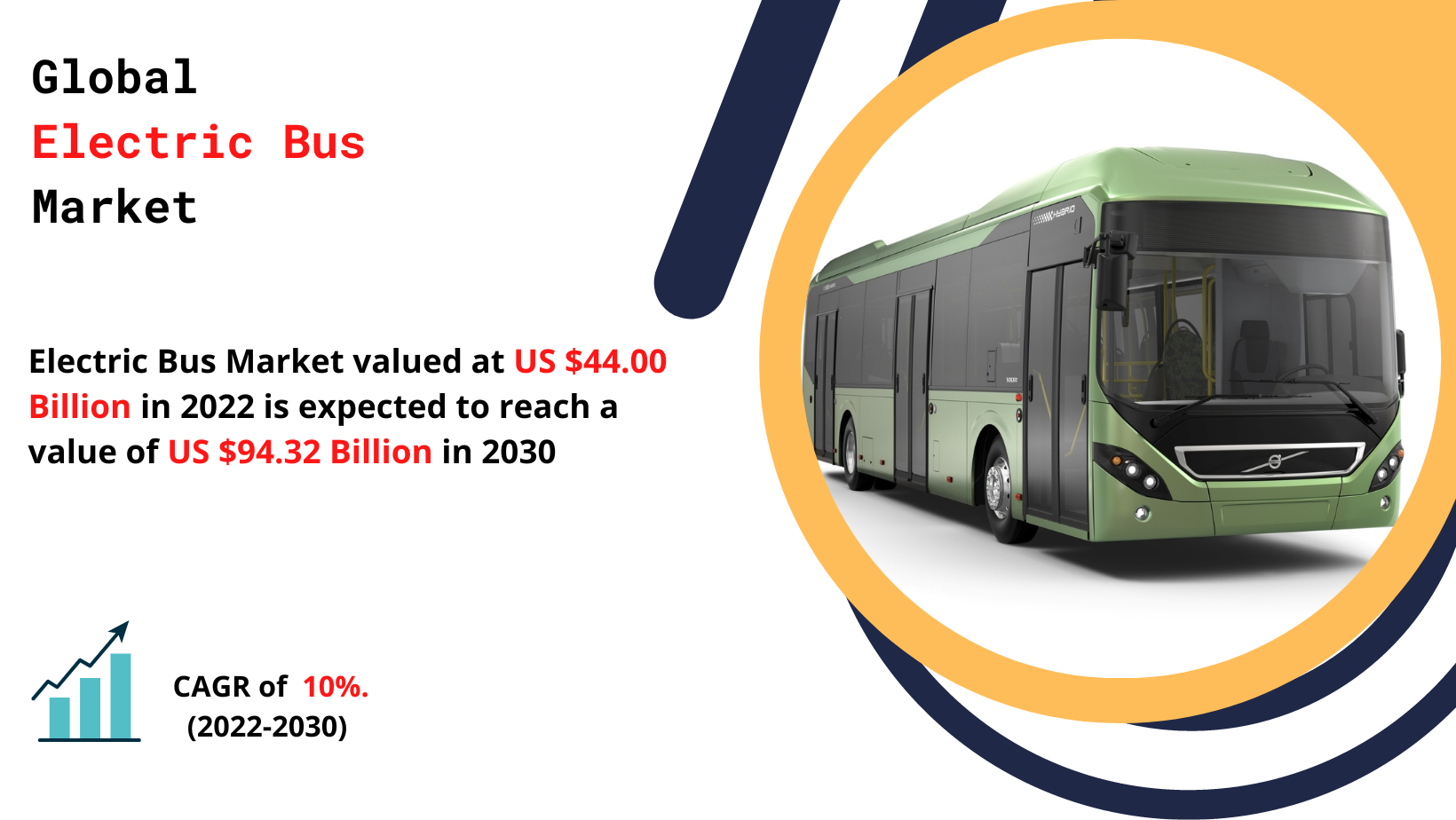Electric Bus Market valued at US $44.00 Billion in 2022 is expected to reach a value of US $94.32 Billion in 2030, growing at a CAGR of 10%.

The global Electric Bus Market was worth USD 29.17 billion in 2021 and is anticipated to expand at a CAGR of 20.2% over 2022-2030, thereby amassing USD 105.8 billion by end of the assessment timeframe.
An electric bus is referred to as a type of electric vehicle that runs on electric motors instead on an internal combustion engine. In order words, the propulsion and accessory systems of these buses are propelled by a zero-emission electricity source. The source of electricity in these vehicles are predominantly derived from overhead wires, onboard batteries, hydrogen fuel cells, or ground-based non- contact conductors, among others.
Growth propellants and restraints of this industry vertical
The rising focus of nations on promoting the mass electrification of public transport vehicles to reduce emission and pollution levels is primarily augmenting the outlook of this industry sphere.
Furthermore, stringent emission regulations implemented by various governments, technological innovations in the field, and prompt urbanization are adding momentum to the market progression. Also, elevating costs of crude oil and significant decrease in battery prices are positively swaying the industry dynamics.
Moreover, the growing popularity of natural gas fueled vehicles coupled with increasing R&D investments in the field are creating an upward trend for the market growth. Besides, population expansion has increased the number of commuters across the globe. This in turn is fueling the overall market development.
On the contrary, high productions costs pertaining to electric buses along with their low fuel efficiency are hindering the remuneration of the business vertical.
Key Trends Of Global Electric Bus Market:
Increase In Demand For Fuel-Efficient, High-Performance, And Low-Emission Buses
Gasoline being a fossil fuel is not a renewable source of energy, and is expected to be exhausted in the future. To back-up sustainable development, it is important to develop and use substitutional sources of fuel. This involves use of electric buses, which do not use gas and are more economical than conventional buses. An electric bus converts over 50% of the electrical energy from the grid to power at the wheels, whereas the gas-powered bus only manages to convert about 17%–21% of the energy stored in gasoline.
Stringent Government Rules And Regulations Toward Vehicle Emission
The conventional gas-powered vehicle makes use of an internal combustion engine to enkindle power. In an ideal scenario, the combustion system fully incinerates the fuel and only creates carbon dioxide and water as a waste, however, the combustion system generates various greenhouse gases, leading to environmental pollution. On the contrary an electric bus uses an electric motor powered via a continuous supply of current and does not create any pollutants.
Get Exclusive Sample Copy of This Report Here: https://wemarketresearch.com/sample-request/electric-bus–market/167/
Segmental assessment of global electric bus market
Based on vehicle type
Among these, the battery electric bus segment is slated to amass notable gains over 2022-2030 owing to the decreasing battery costs across the globe.
By length of bus type
The 9-14 segment is poised to garner significant returns over the assessment timeline. This is ascribed to the rising volume of public transport commuters across the globe.
In terms of range, the market is fragmented into less than 200 miles and more than 200 miles. The less than 200 miles segment is segment to capture a high revenue share over 2022-2030. This is attributable to the lesser operating costs and lower recharging time taken by electric buses.
On the basis of battery capacity
The up to 400 kWh segment is anticipated to showcase lucrative growth trends over the analysis timeline. This electric buses equipped with the battery capacity of up to 400 KwH are lightweight, affordable, and efficient in nature, which in turn is contributing to the segmental expansion.
Elucidating the geographical ambit and competitive landscape of the industry
North America, Asia Pacific, Middle East & Africa, Europe, and Latin America are constituting the geographical ambit of global electric bus market. Among these, Asia Pacific is presently leading the overall market in terms of revenue share. This is attributable to the presence of major players, rigid emission norms, population expansion, and accelerating demand for fuel cell buses.
The prominent players operating in the market vertical are AB Volvo, Anhui Ankai Automobile Co., Ltd., Beiqi Foton Motor Co., Ltd., BMW AG, BYD Company Ltd., Daimler AG, Ford Motor Company, General Motors, Honda Motor Co., Ltd., Hyundai Motor Company, Irizar S.C., Iveco SpA, MAN SE, Mitsubishi Motors Corporation, NFI Group Inc., Nissan Motor Corporation, SCANIA AB, Tata Motors, Tesla, Inc., Toyota Motor Corporation, Volkswagen AG, VDL Bus & Coach B.V., and Zhengzhou Yutong Bus Co., Ltd.
Notably, in December 2021, Daimler inked a partnership deal with Meritor to enhance its product portfolio.
Buy Now this Premium Report to Grow your Business: https://wemarketresearch.com/purchase/electric-bus--market/167/?license=single
Frequently Asked Questions
WE MARKET RESEARCH is an established market analytics and research firm with a domain experience sprawling across different industries. We have been working on multi-county market studies right from our inception.
Nov 05, 2022